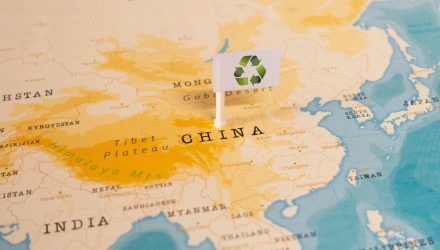When it comes to environmental, social, and governance (ESG) being part of the corporate lexicon and mentions on earnings calls and in regulatory reports, it’s not a stretch to say that Western economies, including Europe and the U.S., are leaders.
Conversely, it can be said that the emerging economies, including China, have some work to do when it comes to broader implementation of ESG standards at the corporate level. It appears the world’s second-largest economy is cognizant of that fact. That could have longer-ranging implications for exchange traded funds such as the KraneShares MSCI China ESG Leaders ETF (KESG).
KESG, which tracks the MSCI China ESG Leaders 10/40 Index, is less than two weeks removed from its third birthday. The KraneShares ETF focuses on publicly traded Chinese firms that sport strong ESG scores relative to sector peers. The fund is a relevant at a time when more Chinese companies are prioritizing ESG and upping related reporting.
KESG Could Be in the Spotlight
Though it doesn’t directly mention KESG, a recent study by Fidelity highlighted the potential utility of the ETF. The survey indicated 53% of Chinese companies have ESG or sustainability strategies, and roughly a third are moving to address those issues on an internal basis.
Perhaps further enhancing the point that KESG is a pertinent ESG idea over the near and long term is the point that 64% of Chinese firms are already making ESG disclosures, and 30% of those that are currently not doing so plan to change that in the future.
“While the development of ESG strategies in Chinese listed companies might still have further to go to reach global standards, Chinese customers and shareholders are increasingly impacting the sustainability progress of companies,” reported Michelle Ng for ESG Clarity.
Another point that could work in favor of KESG over the long term is the fact that Chinese companies have various reasons to embrace ESG and broaden related disclosures. Forty-seven percent believe it’s an avenue for better relationships with customers, while 44% see that improved ESG standards are important to investors, added Fidelity. Another 37% view ESG as an opportunity to improve relations with the Chinese government. These companies are displaying ESG commitment in other ways.
“For instance, 66% of the companies surveyed consulted key stakeholders to align their ESG plans with their own objectives or conducted a materiality assessment to determine which ESG goals to focus on,” noted ESG Clarity, citing Fidelity. “On the other hand, 56% of them hired professionals such as ESG advisers or consultants when stipulating their sustainability strategies.”
For more news, information, and analysis, visit the Climate Insights Channel.

